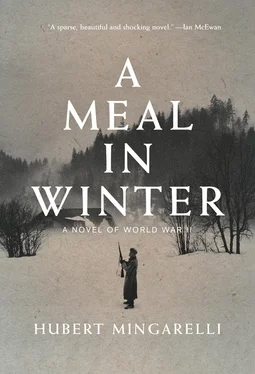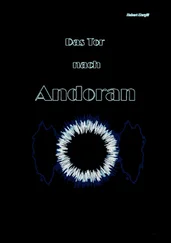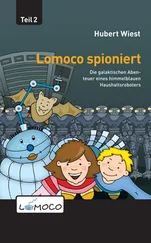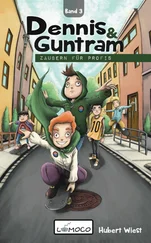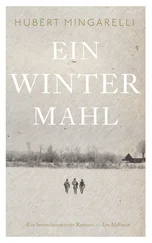‘All right,’ he shouted suddenly.
We jumped. But we didn’t know what he was agreeing with. He took his knife out and, on the bench, cut the salami into twelve thin slices, so perfectly equal that we could have chosen one with our eyes closed. He dropped six slices into the soup and we helped ourselves to the others.
There was nothing left to discuss now. Each of us had two slices, and we could do what we liked with them. Would we eat them straight away? Would we keep them to eat with our bread when it was warm enough? Or did we have enough will power to wait for the soup to cook, so we could eat it all at the same time?
I didn’t even have time to think about it. One of the slices was already in my mouth, and the second followed it soon afterwards. Emmerich and Bauer had scoffed theirs too. And if we’d followed our instincts, we’d have fished the other slices out of the saucepan and eaten those too. The taste of it that remained in our mouths felt so good, yet at the same time it was torture. We couldn’t stop drooling, and wanting more.
Before he sat down with us on the bench, Bauer dipped a finger in the soup and said, ‘Lukewarm.’
I couldn’t believe it. ‘Only lukewarm?’
‘Yeah.’
I glanced at what remained of the trapdoor: barely half of it.
‘If it’s only lukewarm now, we’re going to have to burn everything, including this,’ I said, tapping the bench.
‘Never mind,’ said Bauer. ‘We’ll burn everything, then. I’m hungry. The table, too. Who cares?’
He sat down between us. That is the difference between wood and coal. Wood burns fast.
We smoked another cigarette because there was nothing else to do, apart from watching the fire in the stove. The window had quickly frosted over and no longer let much light through. The flames behind the mica window lit us up like an electric bulb.
And, because there was nothing to do now but wait for the soup, I sensed that Emmerich was quietly withdrawing into himself, and I knew what he was thinking about, which problem he was once again struggling with in his mind. Bauer knew too, and he nodded to me discreetly, just between the two of us. I replied in the same way. We were sorry for Emmerich, but what could we do?
The three of us were silent. We smoked without speaking. But Emmerich’s silence was different to ours, and Bauer and I could feel it. His silence grew ever thicker. But only from the outside, because inside his head, his son was making so much noise — knocking hard on the door of his conscience — that Bauer and I could hear him. So how loud the din must have been inside Emmerich’s head. I remembered that the three of us were supposed to think about his problem together. I’d promised him that as we stood by the frozen pond. He probably didn’t dare remind me of this. He was probably waiting for me to say something. But I wanted to smoke first.
The Jew started coughing again. I turned round to look. He was sitting with his legs folded under him. The temperature had risen inside the storeroom too: he had opened his coat. Underneath he was wearing a thick quilted jacket. And even though, from here, I could not see the snowflake embroidered on his hat, I thought about it anyway, though distantly and not for long.
Yes, I felt like finishing my cigarette before helping Emmerich. It was peaceful, smoking in front of the stove. I wanted to savour that moment until it was over. That was why I waited. But I knew there was also a bit of spite in it. Because there had been times when I’d needed help too.
You could smell the rotten apples. They’d stuck to Emmerich’s boots when he came down from the attic. They smelled almost like jam. Oh, if only we’d had some jam to eat after the soup! Emmerich got up and turned the bread over on the edge of the stove, then sat back down. And, once again, I heard his son knocking.
IT WAS NOT the first evening, nor the second, but the third evening after the first shootings that Emmerich started fearing for him. And since then, the fear had never left him. It was probably his son that Emmerich saw when he stared at Bauer and me, later, in the spring, while he was dying under the bridge in Galicia. No, in truth I don’t know if it was him that Emmerich saw when he looked through us. But I hoped it was him, so that he could have seen him one last time while he died, to help him. And, through hoping, I ended up believing it.
But on that evening — the third after the first shootings — we came back from outside, where Graaf had called us, the whole company, for no good reason: to tell us about some coal that had been stolen and sold to a Pole. Emmerich had sat on his bed, face pale, and sighed pitifully, then told us — Bauer and me — about his son, with such intensity in his voice that we didn’t dare take off our coats, as if by doing so we would have deprived him of something.
We listened to him. He had a lot to say. Emmerich had been holding this in for three days. We understood that the distance between his home and our base here in Poland had grown longer, stretched out. It was almost as if a wall had risen up between them.
Like everyone else, Bauer and I were still living through the shootings, the killings; they flashed endlessly before our eyes and reverberated in our ears. So much so that listening to Emmerich talking so helplessly seemed strange to us. Could we tell him that? But thankfully, he was not asking us for advice, at least not yet. We listened to him. We understood him and we did not understand him and we were too hot in our coats, and after three days the killings were still filling up our minds, boiling away inside them, and spilling over. And on top of this, all Emmerich’s fears for his son, instead of making us forget our own worries, just made them worse.
We had never thought about his kid before then. We knew he existed, and that was all. He’d talked about him, of course, the way friends always talk to each other about their wives if they’re married or their children if they have any. But from that evening on, Emmerich’s son became part of our lives. He was, so to speak, sitting on Emmerich’s bed. He slept with us that night, and every night after, and he was there with us every morning too, at breakfast. It was as if Emmerich had caught a disease.
After that evening, Emmerich managed to use each event here to talk to us about his son. Not only about his fears, thankfully, but also memories, details. And that was fine. But it was a real disease, all the same. Sometimes Bauer and I couldn’t stand it any more. And we told him so.
THE FIRE SOON died down. I got up and filled the firebox with the wood from the trapdoor. There was enough left to fill it again, but only one more time. So Emmerich got up too, picked up the second chair and smashed it on the concrete slab, so hard that bits of wood flew everywhere. We could see that what he was trying to smash was his problem as much as the chair. He collected the bits and, before sitting down, dipped his finger in the soup.
‘It’s slightly warm,’ he said.
‘At this rate, what we eat will be hot but not cooked,’ said Bauer in a resigned voice.
‘There’s a fence outside,’ I said. ‘But it’s covered in snow. We’d never get to it.’
‘If only there were coal,’ Bauer said, ‘that would be perfect. We could sleep, and when we woke up it would be cooked.’
I looked around me. There was still the shelf. After that, we’d have to burn the bench, and after the bench, the table. But then where would we eat? The concrete slab was still frozen. We’d have to eat standing up.
‘What we eat will be cooked,’ I said, ‘but we’ll eat standing up. It’s not the end of the world.’
Читать дальше
